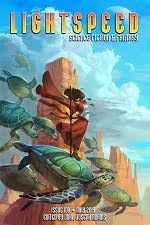“The Ocean That Fades Into Sky” by Kathleen Kayembe
Reviewed by Jason McGregor
This month’s Lightspeed stories move from a longer novelette to a shorter one and then to a short story and a shorter one. The last two avoid direct narrative and the first and last (arguably) avoid genre commitments. Coincidentally or not, the issue’s best tale is the second, which is a science fiction narrative, though even it doesn’t stick the landing.
“The Ocean That Fades Into Sky” by Kathleen Kayembe
Uloh-la is a world that has been colonized by evil white gods who subjugate the native brown gods and have annual summits to make sure the native gods are serving them properly. In a Romea Montague/ Juliet Capulet or Sharks/Jets motif, a woman from each group of deities loves the other but the native goddess, Coasts, has been pretending to be Ocean as part of a plan and has recently entrusted this secret to her invader lover, Obsequies. Given Obsequies’ feelings of betrayal, the plot’s tension is supposed to reside in whether she will betray Coasts in turn, which could result in Obsequies’ family (Cities, Ships, etc.) “killing” Coasts for twenty years and impeding the plan.
Given that the main objective within the story is to commit genocide on cardboard villains and that all the metamorphic members of the polytheistic pantheons have impersonal, usually plural, names and don’t actually die much, it’s hard to get involved with the story which takes a novelette to portray two women dithering over whether or not to utter a sentence or two. (Most of the time, aside from that, is spent dealing with its thinly veiled concerns about race, assimilation, colonialism, and environmentalism.) Also, while SF/F blends can appeal to some, I suspect this particular mix of foreground fantasy with a vaguely science fictional background may not work for people who especially enjoy one or the other.
“This Way to Paradise” by Rati Mehrotra
India, Pakistan, and China are in conflict and entire cities’ populations have gone missing (the protagonist’s parents among them) causing people to speculate about superweapons or even aliens. An aunt and her missing sister’s young son and daughter have met a possibly crazy man babbling of paradise which caused the aunt to swing about and head into the teeth of the conflict looking for it. Once in “paradise,” the young girl must risk sanity and life for answers.
Despite conventional elements (wars, alien interventions, the quest for the hidden redoubt, the child of innocence (fantasy) or brain structure (SF) who alone can pass tests or establish communication, etc.) the bulk of the narrative is engaging but the abrupt conclusion feels undercooked and unconvincing. However, some readers may not have a problem with it or may find enough in the conflict (reminiscent of David D. Levine’s Sino-Indian strife in “Command and Control” (Infinity Wars, 2017)) and the insanity-inducing alien communication (reminiscent of Zack Be’s “True Jing” (Asimov’s, Jul/Aug 2018)) to compensate for it.
“Truth Is Like the Sun” by Matthew Kressel
This “story” is composed of snippets of social media items about a transsexual musician livestreaming a performance from space and its effects on transsexuals and space travel.
The plot-less format (complete with spam and conspiracy theories), length (which feels interminable despite being just under five thousand words), and unconvincing apples and oranges make this a chore to read.
“The Minor Superhero, at Home after His Series Ends” by Adam-Troy Castro
The narrator briefly monologues about a minor superhero (4 on a scale of 10) having had his moment in the sun and then just getting by like most of us (who are probably something like 0.1 on that scale).
This is yet another tired deconstruction of tired constructions, aspects of which are reminiscent of the same author’s very recent “The Unnecessary Parts of the Story” (Analog, Sept/Oct 2018) and countless other tales, and other aspects of which bring to mind Jim Marino’s superior “Captain Midrise” (Apex, December 2018). This is a story with no plot or fresh concepts, but it does contain a mildly amusing bit about the superintendent of the superhero’s building.
More of Jason McGregor’s reviews can be found at Featured Futures.
 Lightspeed #108, May 2019
Lightspeed #108, May 2019